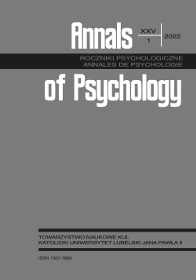Cognitive Evaluation of Conflict and Emotional Dimension of Adolescents’ Strategies for Coping With Social Conflict
Cognitive Evaluation of Conflict and Emotional Dimension of Adolescents’ Strategies for Coping With Social Conflict
Author(s): Danuta Borecka-BiernatSubject(s): Social Sciences, Psychology, Developmental Psychology
Published by: Towarzystwo Naukowe KUL & Katolicki Uniwersytet Lubelski Jana Pawła II
Keywords: adolescents; cognitive evaluation; emotional reactions; coping strategy; social conflict situation
Summary/Abstract: The aim of the research was to cognitively appraise a conflict and provide an emotional reflection on the significance of the situation in triggering destructive and constructive coping strategies used by adolescents in a social conflict situation. The study used the Stress Assessment Questionnaire (SAQ) by Włodarczyk and Wrześniewski, the Three-Factor Inventory of Personality States and Traits (TIPST) by Spielberger and Wrześniewski and the Questionnaire to study adolescents’ strategies of coping in a situation of social conflict (KSMK) by Borecka-Biernat. Empirical research was conducted in secondary schools and included 893 adolescents (468 girls and 425 boys) aged 13–15 years. Analysis of the research results shows that the situational appraisal of a conflict as a threat or the dispositional appraisal of a conflict as a harm/loss, as well as reacting to it with anger or fear, perceived as a temporary emotional state and as a learnt behavioural disposition, co-occurs with the tendency to react destructively to a conflict in adolescents.The research has also shown that an adolescent facing a conflict situation—but not appraising the situation dispositionally as a threat/loss and reacting to it with a learnt behavioural disposition to react with curiosity—will apply a constructive strategy to cope with the situation.
Journal: Roczniki Psychologiczne
- Issue Year: 25/2022
- Issue No: 1
- Page Range: 47-66
- Page Count: 20
- Language: English

